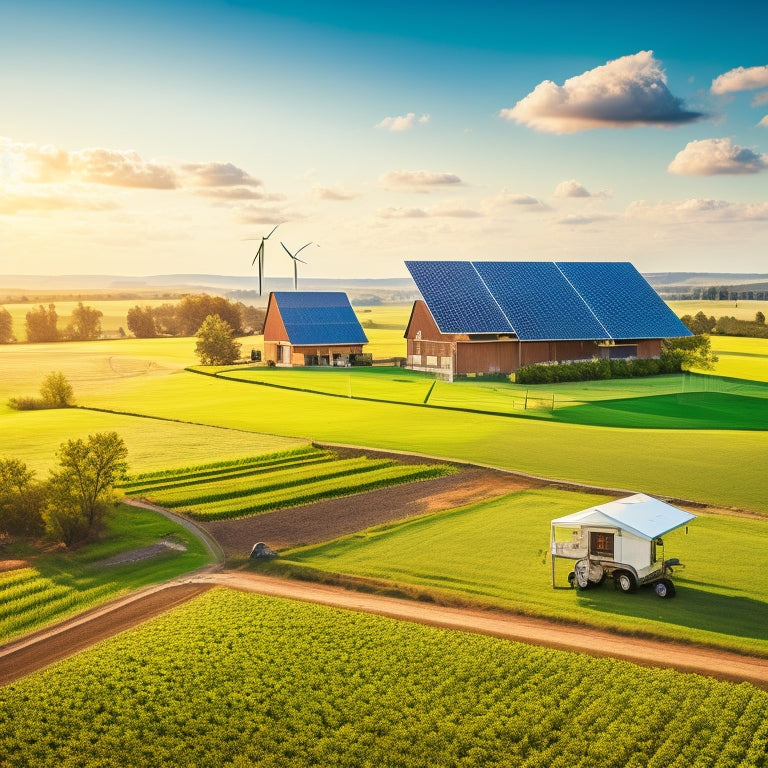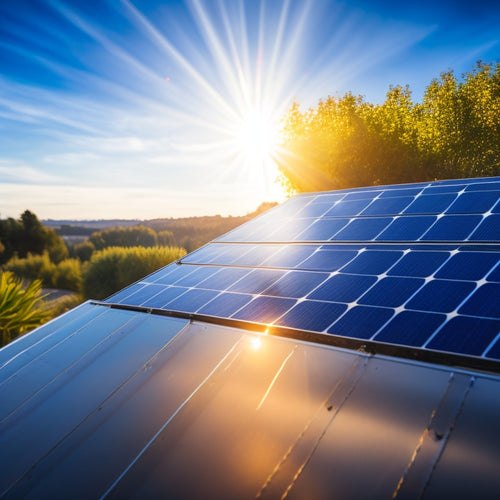
Top Brands for Farm-Scale Renewable Energy Systems
Share
You're looking for top brands for your farm-scale renewable energy system. For solar energy, consider Panasonic, Trina Solar, and SunPower for high-efficiency panels made with environmentally friendly materials. For inverters, Huawei, SMA, and Fronius offer high efficiency ratings. Leading battery storage systems come from SimpliPhi Power, Rolls-Surrette, and East Penn Deka. Wind turbine manufacturers like Vestas and Siemens Gamesa provide efficient turbines. Hydro energy solution providers, geothermal system suppliers, and biomass energy equipment makers like ANDRITZ and Valmet also offer reliable solutions. As you investigate these options, you'll find that each brand brings unique strengths to the table, and learning more about their innovations can help you make an informed decision.
Overview
- Panasonic, Trina Solar, SunPower, Canadian Solar, and Hanwha Q CELLS are top solar panel brands for farm-scale renewable energy systems.
- Huawei, SMA, Fronius, Schneider Electric, and Enphase offer high-efficiency inverters for solar farms, ensuring maximum energy output.
- SimpliPhi Power, Rolls-Surrette, and East Penn Deka provide reliable battery storage systems for efficient energy management on farms.
- ANDRITZ, Valmet, Babcock & Wilcox, and Fisia Babcock Environment are notable biomass energy equipment makers for farm-scale renewable energy systems.
- Schneider Electric and other leading brands offer heat pump solutions with high efficiency ratings, maximizing energy savings for farm operations.
Top Solar Panel Brands
When it comes to utilizing solar energy, the quality of your solar panels can make all the difference.
You'll want to invest in top-tier brands that prioritize solar panel innovations and sustainable materials. By choosing high-efficiency panels, you can enhance energy output by up to 45% via optimized angles and tilt Future-Proofing Home Power Systems.
Look for brands like Panasonic, known for their high-efficiency panels made with environmentally friendly materials. Trina Solar is another top contender, offering a range of panels with advanced technology and eco-friendly manufacturing processes.
Other notable brands include SunPower, Canadian Solar, and Hanwha Q CELLS, all of which prioritize sustainable practices and state-of-the-art technology.
Best Inverters for Solar Farms
Your solar farm's performance relies heavily on the inverter's ability to efficiently convert DC power into AC. The right inverter guarantees maximum energy harvest, grid compatibility, and minimal losses. Here's a rundown of top inverter brands for your solar farm:
| Brand | Inverter Efficiency | Grid Compatibility |
|---|---|---|
| SMA | Up to 98.7% | IEEE 1547, IEC 62116 |
| Fronius | Up to 98.5% | UL 1741, IEC 62116 |
| Enphase | Up to 97.5% | UL 1741, IEEE 1547 |
| Schneider Electric | Up to 98.2% | IEC 62116, IEEE 1547 |
| Huawei | Up to 98.9% | IEC 62116, UL 1741 |
When selecting an inverter, consider factors like inverter efficiency, grid compatibility, and monitoring capabilities to guarantee peak performance and freedom from grid restrictions.
Leading Battery Storage Systems
To maximize your solar farm's energy harvest and reduce grid dependence, you'll need a reliable battery storage system to store excess energy generated during the day for use during periods of low sunlight or at night.
Leading brands for battery storage systems include SimpliPhi Power, Rolls-Surrette, and East Penn Deka.
Deep cycle batteries, which are essential for storing excess energy, offer an extended lifespan and can withstand repeated charging and discharging. They efficiently manage energy storage, allowing for the use of excess energy at night or during low sunlight conditions.
Look for systems with high battery efficiency, long lifespan, and low maintenance requirements.
Wind Turbine Manufacturers
When evaluating wind turbine manufacturers for your farm-scale renewable energy system, you'll want to take into account turbine efficiency ratings to maximize energy output.
Siting based on prevailing wind direction and topography affects turbine efficiency and energy output proximity to farm infrastructure, so it's important to assess the manufacturer's consideration of these factors.
You'll also need to assess turbine installation options, including tower height and foundation types, to guarantee a successful installation.
Additionally, turbine maintenance costs will be a key factor in your decision, as regular upkeep is vital to ideal performance.
Turbine Efficiency Ratings
Efficiency ratings are a critical factor in evaluating the performance of wind turbines, as they directly impact the amount of electricity generated.
When selecting a wind turbine, you'll want to take into account the turbine's capacity factor, which represents the percentage of its theoretical maximum energy output. A higher capacity factor indicates better turbine performance.
You should also look at the coefficient of performance (Cp), which measures the turbine's efficiency in converting wind energy into electrical energy. Leading manufacturers typically achieve Cp values between 0.45 and 0.50.
Turbine Installation Options
Selecting the right wind turbine manufacturer is vital to guaranteeing a successful farm-scale renewable energy system installation.
You'll want to take into account turbine installation options that cater to your specific needs. Turbine site selection is essential, as it directly impacts energy production and overall system performance.
Look for manufacturers that offer site assessment services to identify ideal turbine placement. Turbine grid integration is another important aspect, as it provides a seamless connection to the electrical grid.
Your chosen manufacturer should provide grid integration solutions that meet local regulations and standards.
Turbine Maintenance Costs
Approximately 80% of a wind turbine's lifetime costs stem from maintenance and repairs. As you consider investing in a wind turbine, it's crucial to factor in these expenses to guarantee a smooth operation throughout the turbine's lifespan.
You'll need to establish regular maintenance schedules to prevent breakdowns and reduce repair costs. A well-planned maintenance strategy can help minimize downtime, reduce energy losses, and maximize your return on investment.
Be sure to research the maintenance requirements of different turbine models and manufacturers to make an informed decision. By doing so, you'll be better equipped to manage your maintenance costs and enjoy the long-term benefits of renewable energy.
Hydro Energy Solution Providers
As you investigate hydro energy solutions for your farm, you'll likely come across a range of providers offering customized systems to harness the power of moving water. These providers cater to various needs, from micro hydro installations to large-scale hydroelectric projects. When selecting a hydro energy solution provider, consider factors such as environmental impact, grid integration, and energy storage capabilities.
| Provider Features | Key Benefits |
|---|---|
| Dam Technology | High Energy Output |
| Water Turbines | Efficient Energy Conversion |
| System Scalability | Flexibility for Growing Farms |
Geothermal System Suppliers
You'll need to partner with geothermal system suppliers who can provide thorough solutions for your farm-scale renewable energy project.
These suppliers typically include system design experts who can optimize your system's performance, heat pump solution providers who can offer efficient temperature management, and drilling technology providers who can handle the installation of your geothermal wells.
System Design Experts
By the time you're ready to develop a geothermal energy system, you'll need to partner with system design specialists who can optimize your farm's unique conditions.
These specialists will assess your farm's energy needs, soil composition, and water table depth to design a customized system that maximizes energy output.
They'll employ advanced system optimization techniques to guarantee your system operates efficiently and effectively.
Additionally, they'll integrate energy management software to monitor and control your system remotely, providing real-time data to optimize performance and reduce energy waste.
With their knowledge, you can trust that your geothermal energy system will be designed to meet your specific needs, providing reliable and sustainable energy for your farm.
Heat Pump Solutions
Your geothermal energy system's performance relies heavily on the heat pump solution chosen.
You'll need to decide between air source and ground source heat pumps, each with its own efficiency ratings and installation costs. Ground source heat pumps are generally more efficient, but air source heat pumps are more cost-effective.
Look for heat pump solutions with high efficiency ratings to maximize your energy savings and minimize your climate impact.
Consider maintenance solutions and system integration when selecting a heat pump supplier.
Take advantage of government incentives to offset installation costs.
Stay up-to-date with technology advancements to guarantee your system remains efficient and effective.
Drilling Technology Providers
When selecting a drilling technology provider for your geothermal system, it's essential to research and evaluate suppliers based on their knowledge, equipment, and services.
You want a partner that can deliver drilling innovations, ensuring efficient and sustainable extraction of geothermal energy. Look for providers with skill in designing and operating drilling systems that can handle complex geological formations.
Their equipment should be sturdy, reliable, and adaptable to your specific needs. Additionally, consider the range of services they offer, including drilling, logging, and testing.
A reputable drilling technology provider will help you maximize your geothermal system's potential, ensuring a reliable and consistent energy supply for your farm.
Biomass Energy Equipment Makers
Among the pioneers driving the biomass energy revolution are equipment makers who design and manufacture systems that convert organic matter into usable power. You're likely looking for top brands that can help you utilize biomass energy efficiently and sustainably. When selecting a biomass energy equipment maker, consider factors such as biomass fuel sourcing, system design, and compliance with biomass energy regulations.
| Brand | Specialization | Notable Projects |
|---|---|---|
| ANDRITZ | Biomass boilers, gasification | 50+ biomass power plants worldwide |
| Valmet | Biomass-fired power plants, pulp mills | 100+ biomass projects globally |
| Babcock & Wilcox | Biomass boilers, emissions control | 80+ biomass power plants in the US, Europe, and Asia |
| Fisia Babcock Environment | Biomass combustion, air pollution control | 20+ biomass projects in Europe, Asia, and the Americas |
Frequently Asked Questions
What Is the Average ROI for Farm-Scale Renewable Energy Systems?
You can expect an average ROI of 8-12% for farm-scale renewable energy systems, which translates to significant financial benefits over an investment timeline of 10-20 years, giving you the freedom to reap long-term rewards.
How Do I Choose the Right Renewable Energy System for My Farm?
Imagine a 200-acre Iowa farm, where you're seeking energy independence; to choose the right renewable energy system, you'll need to assess your farm's energy demands, guarantee system compatibility with existing infrastructure, and conduct an energy assessment to determine the best solution.
Can I Use Renewable Energy to Power My Farm's Irrigation System?
You can definitely use renewable energy to power your farm's irrigation system, leveraging solar pumps or wind turbines to reduce reliance on fossil fuels and increase energy independence, while also cutting costs and environmental impact.
Do Farm-Scale Renewable Energy Systems Require Special Permits?
As you traverse the uncharted territory of farm-scale renewable energy, you're like a sailor charting a new course, requiring special permits to avoid treacherous regulatory waters, ensuring compliance with permit requirements to keep your sustainable expedition on track.
Can I Sell Excess Energy Back to the Grid With Farm-Scale Systems?
You can sell excess energy back to the grid with farm-scale systems through net metering benefits, which track your energy production and consumption, and energy buyback programs, allowing you to offset your energy costs and gain financial freedom.
Ready to Buy
As you chart the terrain of farm-scale renewable energy, you're spoiled for choice with top-tier brands vying for attention. Like a skilled conductor, you'll orchestrate a arrangement of solar panels, inverters, and energy storage systems. The harmony of wind turbines, hydro power, geothermal systems, and biomass energy equipment will create a melody of sustainability. With these industry leaders, your farm will become a guiding light of eco-friendliness, illuminating the path towards a greener future.
Related Posts
-

How Efficient Are Thin Film Solar Cells
Thin film solar cells provide an innovative approach to energy generation, boasting efficiency rates generally betwee...
-

Replacing Old Appliances With Sustainable Alternatives
Replacing old appliances with sustainable alternatives can change your home into an energy-efficient space. Not only ...
-

Top Solar Powered Camping Fans for Camping Enthusiasts
If you're a camping enthusiast, a solar-powered fan can be a transformative element for your outdoor experience. Thes...


